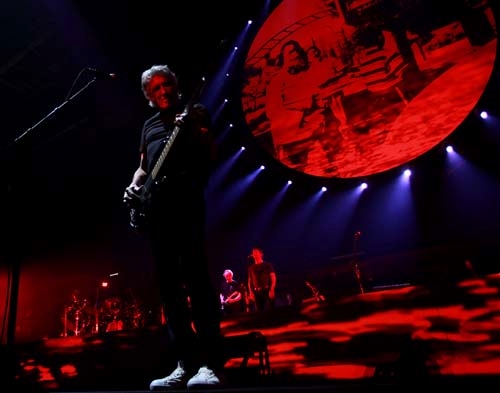Waters rebuilds ‘The Wall’ in Las Vegas


The first thing he did was march onstage, arms in the air locked in a triumphant "V," grinning like a school kid who’d just snuck a peek inside the girl’s locker room.
This kind of super-sized smile can be associated with many things — losing one’s virginity, finding a forgotten $20 bill in the washing machine, bottomless margaritas — but Roger Waters?
Not so much, especially when it came to the performance he was about to give, encompassing a song suite so bleak and broken at times, it was as if it was penned from the fetal position.
On Friday night at the MGM Grand Garden, Waters played, in its entirety, "The Wall," the charred-black rock opera from his former band, stadium rock progressives Pink Floyd.
Released in 1979, "The Wall" was a highly personal story of a disenchanted rock star becoming increasingly detached with not only his audience, but the world at large as he clasped at the frayed threads of his sanity.
During the brief, but mammothly conceptualized tour that followed, which played but four cities in the States and abroad, "The Wall" came to life as a visual metaphor for the barriers that, according to Waters, we erect in life to shield us from hurt, built brick by brick onstage, until the band was completely obscured by the end of the first set.
Three decades later, some of those theatrical elements remained intact — the gradual construction of said wall, some three stories high, and it’s toppling at concert’s end; the towering, grotesque puppets (an overbearing headmaster, a mean-looking mother, a flame-haired temptress with talons for hands, all with stern countenances and glowing eyes); cartoonist Gerald Scarfe’s sexually charged animations, which looked like transmissions from Satan’s libido.
But while the look of the production may have resembled its earlier incarnation, its theme was broadened considerably into an indictment of war, the military-industrial complex, conspicuous consumption and organized religion.
This was a spectacle with subtext, every last arena rock conceit harnessed in a bid for something more than applause, namely, empathy.
And in typical Waters fashion, it was done with the ground-quaking bombast of a warhead exploding inside the arena.
During the reflective, piano-laced "The Thin Ice," images of those who have died in armed conflict, from 9-year-olds to firefighters, were projected onto the wall in an apparent effort to humanize war.
As the band played "Goodbye Blue Sky," a fleet of animated bombers dropped a payload of crosses, stars of Israel, Shell oil logos and dollar signs — a critique of capitalism that certainly didn’t extend to the merchandise stand, where T-shirts fetched upwards of $40.
Elsewhere, the show teemed with Orwellian flourishes, from images of large security cameras and surveillance videos to warnings that "Big Brother Is Watching You."
"Should I trust the government?" Waters asked in song during "Mother."
"No way," the projections screamed, with an expletive thrown in for good measure.
During that number, Rogers sang a double-tracked version of the tune, dueting with himself, essentially, with vocals taken from a London performance of "The Wall" 30 years ago as black-and-white footage of himself was projected behind him.
It was one of the most explicit connections between the past and the present, and a crucial one, as this was more of a re-imagining of "The Wall" than a restaging of it.
Still, some of the same blustery thrills remained: the classically expressive guitar soloing during "Comfortably Numb"; the galvanized stomp of "Run Like Hell"; the inflatable pig that hovered above the crowd during "In The Flesh."
But clearly, the mood was different, and it began with Waters, playing air drums, swinging his fists like he was battling some invisible foe, looking every bit as animated as one of Scarfe’s renderings.
"When I wrote ‘The Wall,’ I was famously disenchanted," he announced at show’s end. "Thirty years later, that’s no longer the case."
But while Waters may have changed, you could tell that he doesn’t feel like the world around him has kept pace. And this, perhaps, was the ultimate thrust of this show, for the black-and-white photographs of soldiers fallen in the wars of yesteryear looked remarkably similar to those of today.
Contact Jason Bracelin at 702-383-0476 or e-mail him at jbracelin@reviewjournal.com.
REVIEWWho: Roger Waters
When: Friday
Where: MGM Grand Garden
Attendance: 13,000 (sold out)
Grade: A












